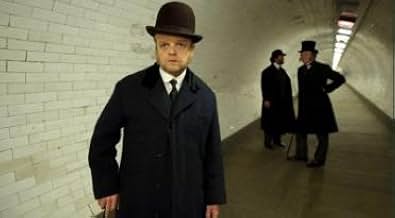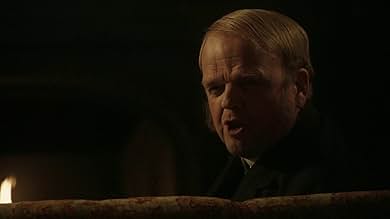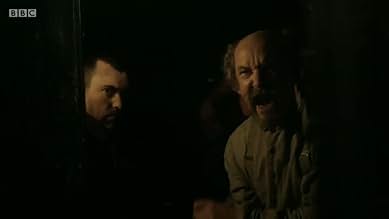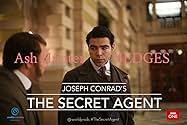Verloc, the owner of a seedy shop in Victorian Soho, plays a dangerous game spying on an agitating anarchist group that will prove useful to the foreign power he is secretly working for.Verloc, the owner of a seedy shop in Victorian Soho, plays a dangerous game spying on an agitating anarchist group that will prove useful to the foreign power he is secretly working for.Verloc, the owner of a seedy shop in Victorian Soho, plays a dangerous game spying on an agitating anarchist group that will prove useful to the foreign power he is secretly working for.
- Awards
- 1 win total
Browse episodes
Featured reviews
It's a strange and unconvincing story, but it has its points of interest, as it deals with the murky late Victorian world of mysterious anarchists.
Unfortunately, this BBC version is not very well done. The main problem is that it is too slow and does not flow.
Stephen Graham has a difficult part as Inspector Heat, whose doings and motivations are often obscure. Why he further encumbers this with a heavy Scouse accent is one of the mysteries of the series (I know he's from Liverpool, but he's good at accents).
As for Vicky McClure, what is her accent? It's unrelated to the speech of the rest of her screen family and also seems anachronistic to me (too many glottal stops and -d- for -t- in places). Is it that she is just using her own accent (and does she perhaps do so in every part she gets)?
Unfortunately, this BBC version is not very well done. The main problem is that it is too slow and does not flow.
Stephen Graham has a difficult part as Inspector Heat, whose doings and motivations are often obscure. Why he further encumbers this with a heavy Scouse accent is one of the mysteries of the series (I know he's from Liverpool, but he's good at accents).
As for Vicky McClure, what is her accent? It's unrelated to the speech of the rest of her screen family and also seems anachronistic to me (too many glottal stops and -d- for -t- in places). Is it that she is just using her own accent (and does she perhaps do so in every part she gets)?
This is an interesting period mini-season drama. Acorn dramas tend to below budget, and family friendly productions. This drama takes place in Victorian England in 1885. The acting is good, as are the costumes, and production values. The plot kept me involved, but the story is not so much a spy thriller, but more of a character study. The series' title would lead a viewer to think that the story involves a lot of spy drama and action. Actually, the story revolves around one character, with some police work and international politics. I think the series would have been better with a couple fewer episodes, or, could have been a full length feature film. Overall, the series is okay, and I didn't feel like it wasted my time. But I don't feel as though I would have missed anything if I hadn't seen it. For me, this is another "Meh" series.
I'm puzzled by the reviews that claim all of Conrad's brilliant story have been abandoned. Utterly untrue. All the main points of the original story are here. The betrayals, the ethical compromises, the cowardice. Not a single one missing. What had changed is how the story is told. Conrad jumped back and forth, a device that works better on writing than on TV. There are always some compromise made when covering a written story to a screen of any size. Those made here seen more than reasonable to me. The result is a thoughtful carefully constructed story that resists the urge to pick up the tempo just for the sake of a little "excitement". Some will find the pace slow, but it builds from the meaningless pretense of the characters lives and the mundane tempo of real life.
Some lovely performances by the whole cast. No one is cast as either superhero or supervillain. These are ordinary people of no great distinction, no matter thier place in life. Both evil and justice are flawed and banal.
Some lovely performances by the whole cast. No one is cast as either superhero or supervillain. These are ordinary people of no great distinction, no matter thier place in life. Both evil and justice are flawed and banal.
Joseph Conrad's novel, 'The Secret Agent', is justly acclaimed, a compact and bitter satire nominally about anarchist terrorism but in fact about the wretchedness of the human condition: while ordinary people labour and suffer, we talk about principles and love but will in reality sacrifice anything for an easy life. With hardly a superfluous word, it could easily be adapted into a 90 minute film; but this adaptation lasts three hours, and is slow-paced and boring. Not only that, but the padding serves to undermine the original purpose to no beneficial effect. One of the great characters in the book is the Professor, an extremist (with all the best lines) who asserts he will give everything for the cause, even down to blowing himself up with a bomb he carries on his person at all times should the police come to arrest him. But no actual cause is ever sufficiently revolutionary to earn the Professor's support, and as we see when he is confronted by the stupid, cowardly policeman Heat, his supposed willingness to cause carnage is sufficiently strong to ensure that no-one is ever likely to put him to the test. But in this adaptation, Heat is brave and humane, and he confronts the Professor only for the Professor's bomb to fail to explode when he tries to detonate it, developments that completely miss the point. It's a particular shame to see the usually excellent Vicky McClure stilted and unable to save the story. Sometimes it seems as if those responsible for adapting a story have utterly failed to understand what it is really about; and this series is one such example.
We enjoyed the production, the filming and actors were excellent though we thought it a bit slow. I became interested in the locations because of a book I was reading that mentioned there had never been a "Great Southern Railway" so the main line railway station with that title was a bit of a mystery. The station building and interior appears to be Kelvinhall Art Gallery in Glasgow, presumably with some CGI to change the name on the building. The opulent "embassy" staircase seems to be Glasgow City Hall, and the "Windsor Castle" ship seen at the docks looks like the ship purchased in 2014 by the Royal Yacht Britannia organisation, so are the docks buildings at Leith?
Did you know
- TriviaThe lavish marbled interior shots of the Russian Embassy were filmed within Glasgow City Chambers. The Chambers offers free guided tours to members of the public most days.
- ConnectionsVersion of Sabotage (1936)
- How many seasons does The Secret Agent have?Powered by Alexa
Details
- Release date
- Country of origin
- Languages
- Also known as
- The Secret Agent
- Filming locations
- Thistle Street Lane, Edinburgh, Scotland, Uk(Verloc's shop exteriors)
- Production companies
- See more company credits at IMDbPro
Contribute to this page
Suggest an edit or add missing content







































